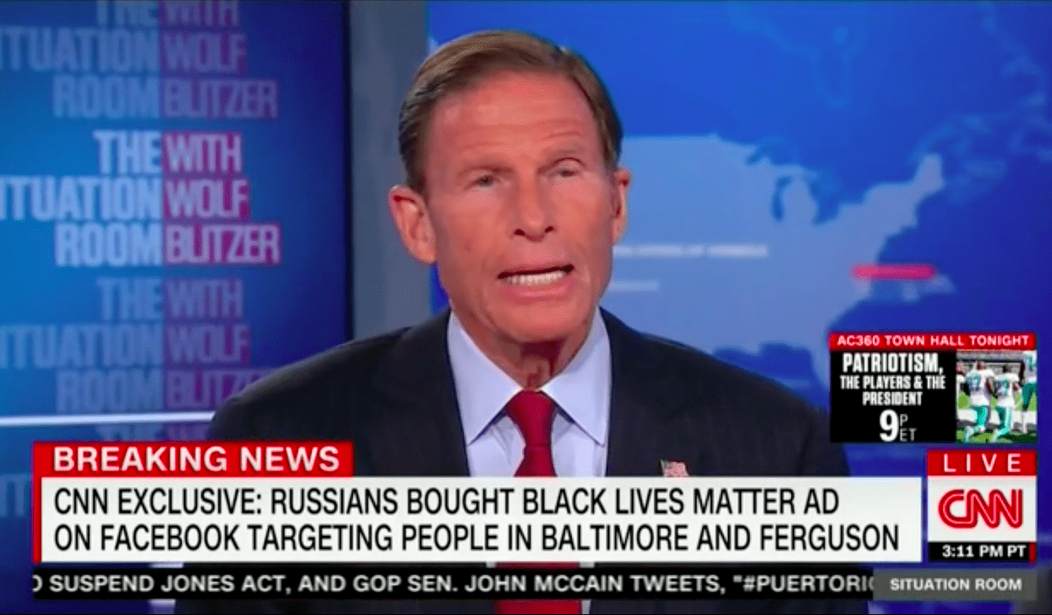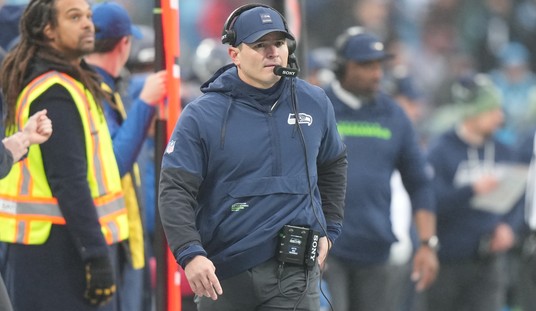On Wednesday evening, Sen. Richard Blumenthal (D-Conn.) suggested that using Facebook to target the cities of Ferguson, Mo., and Baltimore, Md., for Black Lives Matter-themed ads would be too sophisticated for the Russians to figure out on their own. So how did they do it? “Collusion” with the Donald Trump campaign, of course!
“This micro-targeting required sophistication, knowledge, and a great deal of data and research,” Blumenthal told CNN’s Wolf Blitzer. “And the real question, as you’ve just asked it, is how did they know how to micro-target?”
As usual, the Democrat grasped at straws, attempting to pin the Russian attempts to influence the 2016 election on Donald Trump. “There is speculation, to be absolutely blunt, that they received that help from the Trump campaign, which had a great deal of digital information to enable its own targeting,” Blumenthal said.
“So the question is, was there collusion between this Russian internet agency, a St. Petersburg firm of trolls, and the Trump campaign?”
Blumenthal did not even hesitate to name names as to the person in the Trump campaign most to blame. “The public reports are that Jared Kushner was in charge of that digital operation,” he said.
The senator did at least have the good sense to admit that “a lot more investigation needs to be done before we can say with any certainty” that the Trump campaign or Kushner actually did this, however.
Indeed, a lot more investigation needs to be done, because apparently Blumenthal has no idea how Facebook targeting works. When a company pays for an ad on Facebook, the social media platform allows the buyer to customize which people receive that ad. The company can target people with specific interests, people in a geographic area, or people who “like” various things — from movies and television shows to political organizations and causes.
“Micro-targeting” may sound highly technical, but Facebook has taken great pains to make ads very accessible and user-friendly. In reality, most digital marketers launch these ads every day, and it is extremely easy to do what this Russian “firm of trolls” accomplished. The “specialized” “digital” “expertise” could have all been picked up by doing a few tests and reading Facebook’s directions.
Furthermore, both Blitzer and Blumenthal abused the term “micro-targeting.” The Russian Facebook targeting was not “micro-targeting.” Micro-targeting refers to the targeting of specific individuals, not groups of individuals living in one place or interested in one thing. The targeting of people in Baltimore who are interested in Black Lives Matter is not micro-targeting, it’s just geo- and interest-targeting.
The Russians did not need to crack the genetic code to figure out how to target specific geographic areas on Facebook. Furthermore, the association of Baltimore and Ferguson with Black Lives Matter was firmly established by late 2015-early 2016, when these Facebook ads launched.
After all, The New York Times launched a long series about racism in Ferguson following the deadly shooting of Michael Brown. Indeed, days after Brown’s death in August 2014, protests erupted across Ferguson, continuing sporadically for months. Various heads of state and foreign news organizations commented on the shooting, including outlets in China, Germany, Egypt, Iran, Spain, and even … the Russian Foreign Ministry. Huh.
Similar demonstrations — and even riots that destroyed property — broke out in Baltimore following the death of Freddie Gray in April 2015. By April 30, 22 demonstrations had been held nationwide in solidarity with Gray’s death.
It is quite frankly absurd to suggest, as Blumenthal did, that the Russians were not sophisticated enough to associate Black Lives Matter with Ferguson or Baltimore by late 2015 or early 2016 — the time frame in which the Russia-backed Facebook ads ran, according to CNN. Indeed, any such suggestion is an insult to Russia’s intelligence.
In order to tar President Trump and his son-in-law Jared Kushner, Blumenthal was willing to pretend he had no idea how simple it really is to target geographic areas on Facebook or how widespread the knowledge of Black Lives Matter’s connection to Ferguson and Baltimore was by late 2015.
This is “fake news” of the highest order, and Wolf Blitzer should have called Blumenthal out on it. Instead, the CNN anchor stoked the flames.









Join the conversation as a VIP Member